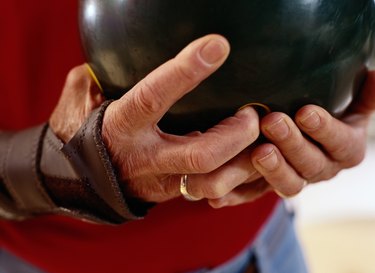Hand-blown glass gazing balls originated in the 1200s and remain a popular garden feature today. The superstitious believed that gazing balls kept witches away from a home by distracting them with their own distorted reflection. Depending upon the version of the legend, the witches either are repelled by their image, or cannot resist admiring themselves. In the latter case, terrorizing the residents would slip their minds. Gazing balls were used more practically in the 1800s for peering around the corner to identify approaching garden visitors.

Video of the Day
The bowling ball-shaped orb has changed little over the centuries. In fact, creative recyclers might spy an actual orphaned bowling ball and ponder its suitability for the job if it were upcycled. "Upcycling" is not merely reusing an item, but transforming it to improve its quality or usefulness. With some paint and imagination, a castoff can turn into a piece of art.
Video of the Day
Things You'll Need
Small Waste Basket Or Large Can
Vinegar
Sand Paper
Admixture
Wood Putty
Grout
Latex Gloves
Spray Paint
Plastic Primer
Clear Silicone
Face Mask Or Respirator
Clean Rag
Preparation
Step 1
Strip the wax finish off the ball. Soak a cloth with vinegar and wipe the ball down.
Step 2
Sand the surface with a fine- to medium-grit sand paper. Paint more readily adheres to a rough surface rather than a smooth one.
Step 3
Determine whether the finger holes should be filled. If they won't be used for pegs or a design element, seal them with wood putty. Keeping moisture out will ensure your project will withstand the elements better.
Step 4
Stabilize the ball. A tiny bathroom trash basket or a large coffee can work well. This will act as a stand when you paint it.
Painting
Step 1
Prime the bowling ball with spray paint. Select primer intended for plastic surfaces. Allow the paint to dry.
Step 2
Rotate the ball and spray the missing spots and allow ball to dry.
Step 3
Add desired paint color after the primer coat, allowing each layer to thoroughly dry. Many metallic polyurethane paints are on the market. Spray in a solid, consistent layer for a traditional look or create special effects.
Mosaic
Step 1
Follow the steps for bowling ball preparation.
Step 2
Apply silicone adhesive to pieces of glass or tile and place each piece on the bowling ball. Place all the pieces and make adjustments before applying grout.
Step 3
Mix grout. In lieu of water, an admixture can be used to stiffen the mixture.
Step 4
Apply grout in between the tiles or glass pieces. To ensure full coverage, do not hesitate to cover the edges of the mosaic pieces. Allow grout to cure for 10 minutes before removing excess.
Step 5
Wipe excess grout with a wet cloth. Let the grout set up for another 10 minutes or more. Seal after 24 hours if desired.
Step 6
Place the new gazing ball in the garden. Hide it among foliage or place it on a sturdy stand.
Tip
When painting the ball, use two additional layers of paint after priming to ensure longevity of the paint. Admix and grout are available in the tile section of hardware stores. Typical gazing balls reflect light, but image reflections do not appear as crisply as they do in a mirror. Rather, reflections appear as they would on a spoon, metallic object or waxed car hood. Perceived images require an attentive and imaginative gaze, hence the name.
Warning
Ventilation is critical. Paint or grout in a well-ventilated area. Do not paint in freezing temperatures because drying time will lengthen dramatically. If selected stand is not sturdy enough to support the bowling ball, a safer alternative is to place it in a basket cushioned by Spanish moss, which is available in craft stores.